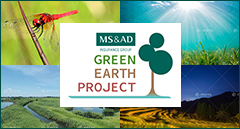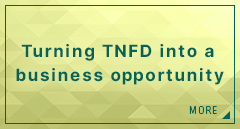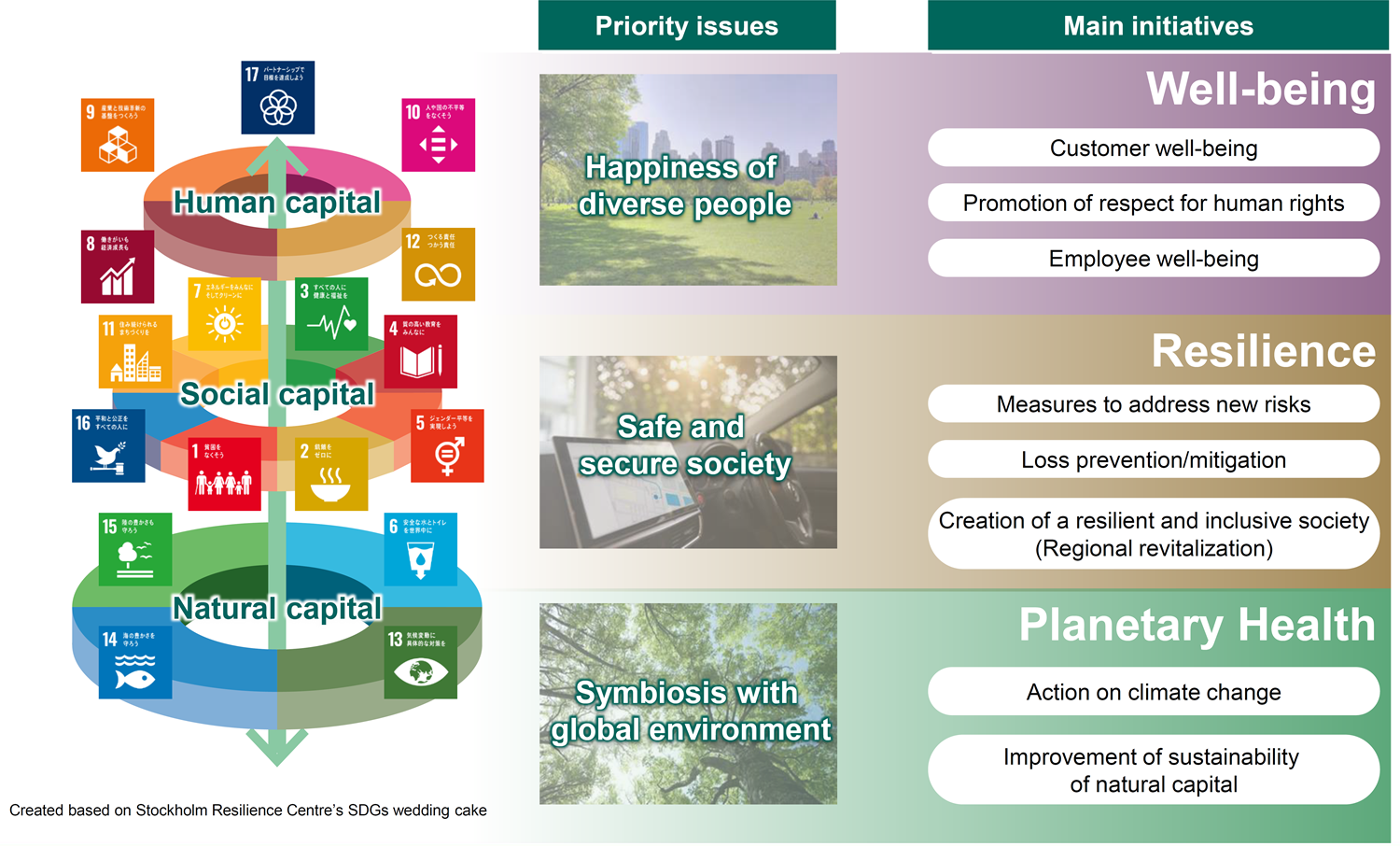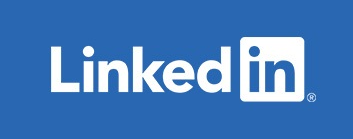The MS&AD Insurance Group has determined “Planetary Health (Symbiosis with the global environment),” “Resilience (Safe and secure society),” and “Well-being (Happiness of diverse people)” as three key areas of focus among various social issues.
Obviously, “Happiness of diverse people” is supported by “Safe and secure society” and “Safe and secure society” are dependent on “Symbiosis with the global environment,” as indicated by the Wedding Cake Model, in which 17 SDGs are organized into three layers: “Nature,” “Society,” and “People.”
As the three goals are closely related, we need to work on them in an integrated manner.
We believe that there is still much that insurance companies, including ours, can do in cooperation with the various parties concerned, such as establishing a nature-positive, safe and secure society that is conscious of coexistence with the global environment and the happiness of people that is generated from such a society.
With the adoption of the 2015 Paris Agreement, a framework agreement on climate change, governments around the world agreed to restrict the increase in the global average temperature to well below 2ºC from pre-Industrial Revolution levels, and to pursue measures to limit that increase to 1.5ºC, and to the transition to a net-zero society based on a substantial reduction in greenhouse gas emissions. Extreme weather events, which appear to be an effect of global warming, are occurring frequently, and adaptation to the climate change is required.
At Convention on Biological Diversity COP15 held in December 2022, a new global goal, the Kunming Montreal Biodiversity Framework, was established, clearly indicating the direction of "to halt and reverse biodiversity loss by 2030" or "nature positive." Achieving nature positive also requires the transformation of the entire social economy, and companies as well as national and local governments are expected to play an important role.
Our society and economy are also supported by natural capital including water resources, and terrestrial and aquatic life, in addition to the climate system. Global warming leads to severe natural disasters and physical changes, such as forest fires and desertification that undermine natural capital. The decline of forests leads to less CO2 absorption which further accelerates global warming. Rising average temperatures increase the frequency of forest fires due to hot and dry conditions, creating a worsening cycle. Climate change and natural capital issues are interconnected and affect society and the economy. The transition to net-zero and nature-positive society will bring about drastic social and economic changes.
The MS&AD Insurance Group has identified "Symbiosis with the Global Environment — Planetary Health" as one of its priority sustainability issues (materiality) in its Medium-Term Management Plan, and is promoting CSV initiatives to create common value with society by positioning responses to climate change and the improvement of the sustainability of natural capital as issues to be addressed in an integrated manner. The Group recognizes that climate-related risks and opportunities, such as large-scale natural disasters, can affect the bottom line in a single fiscal year, while others can emerge over the medium and long term. As an insurance company, we are taking steps to address the risk of large-scale accumulated damage caused by natural disasters, and are upgrading our risk management. In line with the 1.5°C target of the Paris Agreement, we set a GHG emission reduction goal of Net Zero by 2050, and established interim targets to achieve the goal. The Group is committed to promoting the transition to a net-zero society in cooperation with its stakeholders, and is advancing the necessary initiatives. We support the establishment and social implementation of next-generation energy such as renewable energy and hydrogen, as well as innovative technologies for a net-zero society. We also accelerate the assessment of climate change impacts and the provision of services to eliminate or mitigate damage and loss from natural disasters. For example, flood damage has occurred worldwide due to rainfall exceeding expectations. Against this background, nature-based solutions are attracting attention. The Group refers to this concept as “Green Resilience” and is committed to decarbonization as well as disaster prevention and mitigation through environmental restoration and conservation, along with promoting adaptation to climate change.
Rapid social and economic changes resulting from transition to a net-zero society will bring opportunities for the Group's growth, such as stimulated demand for new insurance products and services, and improved performance of our clients along with new industries emerge or technological changes take place.
In the field of natural capital, we are working to provide new products and services that contribute to the conservation and restoration of nature and biodiversity. Some of these products mitigate negative impacts on nature, such as the oceans, forests, soil, and animals, which are also important in responding to climate change. Because it is important for society as a whole to realize nature positivity, the Group has been disseminating the latest information, conducting research, and developing solutions through the development of the TNFD (since October 2021) disclosure framework, initiatives, and partnerships with other companies, governments and academia.
In the transition to a nature-positive society, the burden on companies may increase to avoid the risk of negative impacts. It is important for companies to understand the nature-related risks involved in their business activities and prepare for the increased burden by taking measures in advance. The Group believes that its business model of “identify and inform on risks” provides an opportunity to prepare for these new risks and lead to the Group’s growth.
In recent years, due to the effects of climate change, natural disasters such as extreme rain, floods, and cyclones have become more severe, causing a greater damage throughout the world. As a result, there is an urgent need to promote disaster-resilient community development in terms of both physical and policy-based measures, to reduce the damage and economic losses caused by disasters. For disaster prevention and mitigation, we are working to realize a safe and secure society by promoting DX utilizing various data accumulated through its insurance business. Group will focus not only natural disasters but also focus on various risks faced by society, such as automobile accidents and infectious disease countermeasures with data analysis, risk visualization using AI, and provide solutions. In addition to these sudden events such as accidents and disasters, there is also gradual progress of issues such as declining birthrates and aging populations with declining regional vitality in Japan and in many other developed countries. To sustain long-term employment in regional communities, revitalizing local industries is also essential.
The Group's goal of creating resilient and inclusive communities is to create safe, resilient, and sustainable living spaces in communities where everyone can live with peace of mind. In order to support the safety and security of people's lives, it is important to anticipate the risks that may arise in the event of an emergency and to prepare for an emergency. It is also important to revitalize local industries in order to continue working in the community. Local revitalization is one of the important measures of the government. We are also advancing similar initiatives in collaboration with local governments and a range of regional stakeholders. These efforts include promoting industry tailored to local characteristics and supporting disaster-resilient community development. Among these initiatives, the Group's Green Resilience efforts leverage natural resources for disaster prevention and mitigation while fostering local industry, such as promoting organic agriculture. By making the most of the benefits nature provides, we aim to help realize an inclusive society where everyone can live with peace of mind, no matter where they reside.
The global pandemic has spurred significant changes in society and economic lifestyle patterns. As a result, industries and societies have rapidly digitized, giving rise to a surge in online exchanges, e-commerce, online education, and a shift to remote work. Since the release of ChatGPT in the fall of 2022, society has continued to change, marking further transformation. As technologies like generative AI advance, addressing the emerging risks associated with these advancements remains a critical focus for society. The MS&AD Insurance Group believes that anticipating, preventing, and effectively managing new risks associated with the advancement of innovation and changes in the industrial structure are vital to ensuring stable livelihoods and healthy business activities. By conducting research into new risks and offering products and services to address them, we aim to help maintain a safe, secure society while also creating growth opportunities for the Group.
Japan’s birthrate is declining, society is aging, and total population is declining. According to the Population Projections for Japan (2023) by the National Institute of Population and Social Security Research, the country’s population will drop below 92 million by 2065, with the elderly population rate — the percentage of the population aged 65 and older — exceeding 40%. The rising elderly population necessitates an environment in which the elderly can live with peace of mind. This living environment must give consideration to an urban structure that makes it easy to get about, supports access to information on health and preventive medical care, and is adapted to the decline of bodily functions that comes with age and nursing care. At the same time, urban structures need to facilitate the slowing of population decline by creating an Environment in which pregnant women, children, and people with children can live safely and with confidence. We believe that a state of well-being is one in which all kinds of people are able to accept one another’s social, ethnic and cultural differences etc. for what as they are and live contented lives with peace of mind.
The MS&AD Insurance Group provides not only insurance coverage but also a range of health care services, free of charge or at preferential prices, to support the total health of customers who promote well-being, thereby helping not only individuals but also corporate customers to manage their health-related endeavors and secure human resources.
The 100-year-life span era also brings about new risks to our lives. In addition to extending healthy life expectancy, it is important to increase the so-called "asset life span," which allows us to live without financial concerns. We provide asset-building means to support a fulfilling “second life,” and helps to develop business activities that lay the foundations for a super-aging society and thereby promote customer well-being.
The Group is strengthening its efforts to respect human rights, which is at the heart of well-being. The "MS&AD Insurance Group Basic Policy on Human Rights" covers also to other stakeholders in the Group’s value chain, including suppliers related to the procurement of services and business partners such as agents. We are engaging with these stakeholders in order to prevent and mitigate any adverse impacts on human rights arising out of businesses activities. The Group encourages these parties to prevent and mitigate negative impacts on human rights in their business activities. Based on the UN Guiding Principles on Business and Human Rights, we aim to enhance our corporate value by establishing and implementing a human rights due diligence system, a management system for respecting human rights, and by developing value chains and internal environments that are free from human rights violations. In addition, as human rights initiatives in the insurance and financial services group, we support the concept of "financial inclusion," in which access to insurance and financial services is not limited by poverty or social status, and everyone can utilize these services to improve their economic stability. We have activated our efforts in local subsidiaries, especially in developing countries. We are working to revitalize our efforts, especially in our overseas subsidiaries in developing countries. Expanding business with diverse markets also leads to business opportunities for us, and we are promoting services such as micro-insurance.
In order to help our stakeholders, including customers, realize well-being, it is also essential to realize the well-being of our employees. We believe that this consists of three elements: good physical and mental health, an amenable work environment, and a sense of fulfillment in one’s work. It is important that the diversity of our employees is respected and that opportunities are provided for each individual to fulfill their potential, skills and motivation. We believe that the growth of our employees realized through this process will lead to an increase in our corporate values. Our medium-term management plan calls for securing and developing the human resources to support the implementation of strategies, as well as creating an environment in which employees can flourish. We will create an environment in which our employees feel fulfilled and can work independently and enthusiastically, and foster a climate in which they are challenged to transform and create new value. In addition, we will promote the diversification of the decision-making layer and promote the spread of inclusive organizational management that draws on the knowledge, experience, and values of diverse human resources to inform organizational decision-making.




